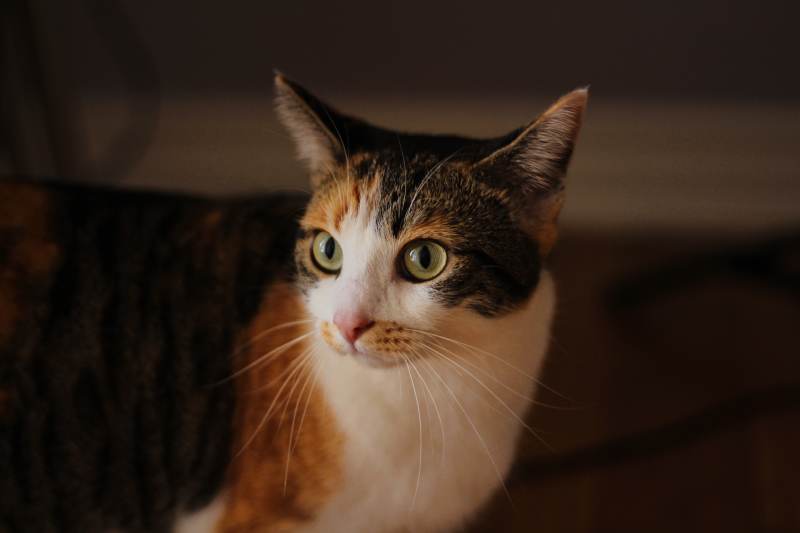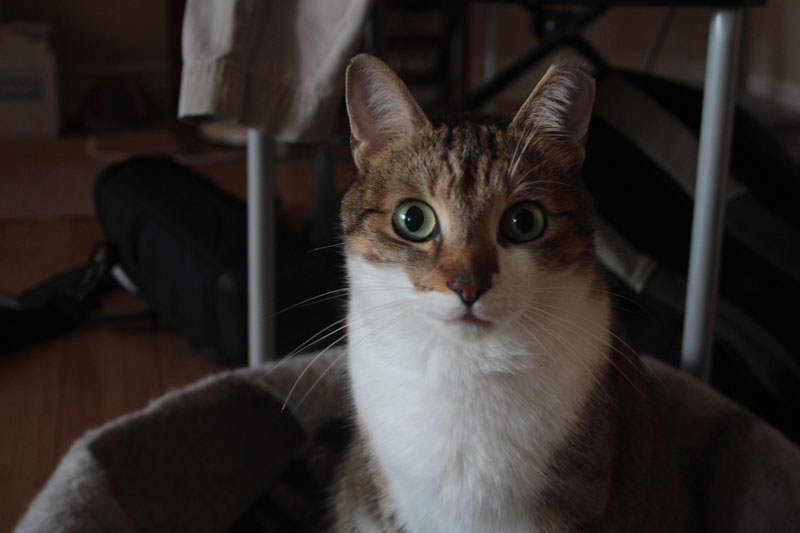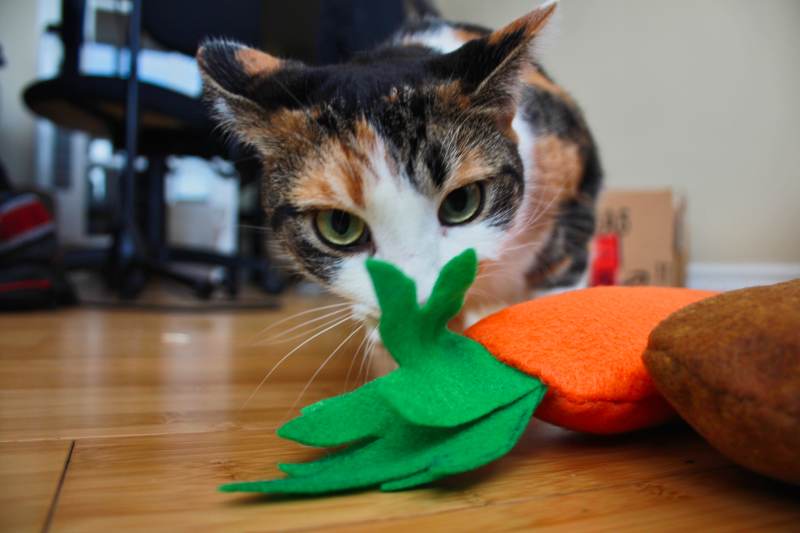Cat owners frequently get a bad rap due to foul smells in their homes. Although this is often a false assumption of a standard cat home, there can be some truth to the matter.
When I was still in the dating game I had someone turn down a date because “your house probably smells from the cats and I would never date anyone who has cats.” While I’m certain that there were other reasons why this individual turned down the proposition smelly cats don’t need to be a thing.
A healthy cat should not have any scent to them due to the fact that cats are meticulous about being clean. It’s for this reason that a healthy cat should not require any baths unless they are known to get into messes outside. Even then, it is very rare that you will be required to give your cat a bath as they will usually clean themselves immediately.
A cat can smell for a variety of reasons, some of which should call for alarm and require a vet visit or a change in said cat’s life. In all cases, it is important to figure out where the foul smell is originating as this will help you deduce what exactly is the problem. The areas in question should be the skin, fur, mouth, anus, and fecal matter.
If you are having difficulty figuring out where the smell is coming from or you think that your cat is “overall stinky” it is a good idea to visit the vet to receive a professional opinion. A vet may require tests to be conducted, especially if the cause is assumed to be from a medical problem. That being said, a vet can commonly diagnose the issue upon giving the cat a quick physical examination and will often provide some suggestions for lifestyle changes.
In the meantime, the following is a list of the most common reasons your cat may appear to be stinky and when the stink is serious enough to take your cat to the vet.

DENTAL DISEASE
Affected Area: Mouth
Dental disease is by far the most common ailment cats get. Not only that, but dental disease is also the most common reason for a stinky cat!
The current average cat begins developing dental disease by the age of three if no steps are taken to help reduce tartar and plaque. So, similar to you and me, it is extremely important that a cat gets their teeth brushed regularly to help reduce build-up. Chew toys or specially designed treats will also help reduce the amount of tartar and plaque, however, vet visits and brushing the teeth are currently considered the most effective method.
The amount of build-up a cat experience is heavily co-related to their genetics (how crowded the teeth are) and the food in which the cat is being fed. Food with higher sugar content will help progress the speed in which teeth rot, especially if food is lodged between abnormal gum pockets.
If a cat goes too long without having their teeth cleaned they can develop gingivitis, bacterial infections or even extreme tooth rot. This will result in much-needed teeth cleaning from a vet, which often requires a cat to be put under.
Dental diseases can also lead to oral tumours or if undealt with may cause issues with the heart.
KIDNEY DISEASE
Source of Odour: Mouth
Kidney disease is also a fairly common disease that affects cats, especially when they are seniors (over the age of 12.)
Kidney disease can be diagnosed through tests run by the vet or can be initially tested with products such as PrettyLitter or Dr. Elsey’s Litter. Although said litters will be able to let you know whether or not your cat’s urine is showing signs of kidney disease, it is still important to get a proper test done by the vet.
Kidney disease often makes a cat’s breath smell like ammonia, which is the smell of a cat’s urine.
Cats who suffer from kidney disease will require a special diet to ensure that the disease does not progress rapidly. Now, a special diet does not always entail a vet specific diet such as Hill’s K/D, however, it is highly recommended that you speak to your vet about the food you feed your cat.
Your vet will be able to help you factor how much fat vs protein your cat needs dependant on how severe your cat’s condition is.
At the end of the day, kidney disease is not a death sentence and many cats continue to live long lives after being diagnosed. Though, as mentioned it is extremely important that you take the proper steps to ensure the wellbeing of your cat.
DIABETES
Source of Odour: Mouth and Fur
Diabetes, similar to Kidney disease is a disease that most commonly affects geriatric cats or cats who are obese. Also similar to Kidney disease, Diabetes can be initially tested with products such as PrettyLitter or Dr. Elsey’s Litter.
Diabetes often produces a sweet smell from a cat’s mouth, though when the disease has progressed your cat may emit the smell of rubbing alcohol or even nail polish.
Cats who have diabetes may also refuse to clean themselves due to their weight or may not be able to reach trouble areas such as the bum. For this reason, it is not uncommon for a diabetic cat to have a foul smell at all times.
This smell can be avoided by giving your cat weekly baths with cat-specific shampoo. It is strongly recommended that you do not use human shampoo on cats as it may cause complications to the cat such as rashes or even toxicity.
A diabetic cat must be treated by a vet and will require insulin shots and a diet change. It is extremely important that you do not treat a diabetic cat by yourself, however, medications and aftercare can be administered from home.
That all being said, a diabetic cat can still live a long and healthy life when the proper care is administered. Diabetes can often be avoided by feeding your cat a healthier diet and providing them with plenty of exercise. It is highly recommended that you speak to a vet about what an ideal food and weight for your cat is as some cats may require specific foods due to their breeds. Reason being? Some breeds are more prone to diabetes and weight gain than others.

LIVER DISEASE
Source of Odour: Mouth
Liver disease is not as common in cats as kidney disease is, however, it is still just as serious. Oftentimes cats who have a liver disease will have very bad breath that smells feces.
Other symptoms include vomiting, ulceration in the stomach, loss of appetite, diarrhea, fevers, abdominal swelling, excessive urination, excessive thirst, jaundice, weight loss or even blood in the stool.
Liver disease absolutely needs to be treated by a vet and will often require a diet change. That being said, a vet may require blood work to be done or other exams such as an X-Ray to be able to diagnose how severe your cat’s condition is.
GENERAL SKIN CONDITIONS (Wounds, Parasites, Lesions, Cancer, etc.)
Source of Odour: Skin and/or Ears
The main reason I’ve lumped everything together as a “general skin condition” is due to the fact that most conditions that involve trauma to the skin tend to have similar if not the same smell.
Often described as a musty smell, this smell is a sign of a body fighting off a yeast infection or other trauma in the body. The same can be said of abscess ruptures or wounds that involve puss.
There is nothing you can really do about these smells other than deal with the underlying condition your cat is facing.
While many small wounds can be helped by using products like Dr. Maggies, more serious wounds, lesions or parasites must be dealt with by a vet. So, if ever you notice something odd on your cat’s skin and don’t know where it came from it is a good idea to get into contact with a vet.
Oftentimes vets will accept photos of the affected area and will let you know whether or not they think it’s necessary to come in.
It is extremely important that you do not treat your cat with any human medications such as Polysporin, Neosporin or any other over the counter drugs. The reason being is many over the counter medications are actually toxic to cats. It’s also illegal to administer over the counter drugs to cats in the United States of America. One of the main reasons this law is implemented is to ensure that cats are not dosed with too much of a medication.
That being said, many skin conditions can be treated with topical creams or steroids that will only be available from purchase with a vet.
ALLERGIES
Source of Odour: Skin, Fur, Ears and/or Fecal Matter
Feline allergies are sometimes difficult to diagnose and are often left to the process of elimination since there aren’t many tests that can be administered by vets.
Allergies often manifest as skin conditions, like rashes, however, may also cause the loss of fur or even diarrhea. Allergies can also cause your cat’s ears to smell like yeast.
The most common allergens (currently known) include poultry such as chicken and various grain/gluten products (such as wheat), however, these aren’t the only allergens that have been discovered. Allergens can also include linens, fragrances, and may even be airborne (like pollen.)
The main reason allergies are hard to pinpoint is due to the fact that it can take up to a month for symptoms to develop or disappear. That being said, if you suspect your cat has an allergy, begin by making a list of ingredients or products you’ve confirmed are potential allergens.
It is also a good idea to speak to a vet about potential allergies. They may be able to suggest some ideas as to what the allergen is based on the symptoms or based on the breed of your cat.

EAR MITES
Source of Odour: Ears
Many outdoor cats, especially strays, have ear mites. Ear mites are treatable, though in some cases are left untreated.
Although this is true, it is still a very good idea to talk to the vet whether or not your cat will need treatment as a severe case will often cause a lot of discomfort for a cat. It is strongly recommended that you do not treat ear mites on your own as a cat’s ears are fairly sensitive and giving them any medications (natural or chemical) may cause long-term problems.
Ear mites commonly appear as dark brown and have a foul smell associated with them.
CAT FARTS
Source of Odour: Anal Region
Although cat farts are completely natural, they can be a sign of a medical problem possible allergies. Although this is true, there are also plenty of reasons a cat will fart that have nothing to do with medical conditions. For that reason, I would recommend reading over this post as it goes into depth about what may cause a cat to fart and how to make sure that they’re not due to an underlying condition.
POOR DIET OR SUPPLEMENTS
Source of Odour: Fur, Anal Region & Feces
A poor diet tends to be one of the biggest non-health related reasons cats are smelly. It’s actually the reason why our youngest, Kalista, was so smelly when we first adopted her.
Due to the fact that Kalista was eating Whiskas wet food her fur was extremely dry, her poops were huge and smelly and overall she just had “stinky cat” written all over her. The worst part about her eating that food was the fact that she farted ALL THE TIME!
Foods that contain more fillers, such as corn, wheat, oats, soybean, etc tend to cause bigger poops as well as poops that have a smell or fermentation. Now, note that good quality food does not need to be extremely expensive. Price does not equal better! Do, however, begin familiarizing yourself with the ingredients of your cat food to ensure that you are feeding primarily meat diets.
That all being said, I’ve lumped supplements into this section as well as many cats with long-term health conditions are required to take supplements. As beneficial as some of these supplements can be, some of them can cause very stinky poops. This should not call for alarm, however, it is always a good idea to consult a vet before giving your cat a supplement, even if a pet store clerk tells you it’s a good idea. Unfortunately, there are a number of supplements that are sold in pet stores that aren’t necessary for cats, but are still pushed as “immunity boosters.”

PARASITES IN THE STOMACH
Affected Area: Feces
Unfortunately, even indoor cats can get parasites. Although it is less common than outdoor cats, it’s a good idea to always be monitoring your cat’s poops to ensure that they do not have worms or other critters living inside them.
Beau, our eldest, got worms from eating one of our shoelaces (due to his Pica). At first, we didn’t notice anything wrong with Beau, until he started pooping out the worms!
Cats who have parasites will often have a larger appetite, have stinky poops and when their fecal matter is split apart often the parasite will be present. Now, some parasites are better at hiding themselves in a cat’s belly and will require an ultrasound or alternative examination from the vet.
All forms of parasites should be treated by the vet and I highly recommend avoiding medications that can be bought online or in pet stores (unless instructed by the vet.) The reason I say this is because each parasite will need a different type of treatment. The same can be said about human parasites.
Some “catch-all” medications are also much too harsh on a cat’s body and have the potential to cause longterm problems, especially to a cat’s digestive tract. It is much better to be safe than sorry.
Note: If you notice a parasite in your cat’s fecal matter immediately take a picture and send it to your vet. Oftentimes vets will be able to diagnose what parasite your cat has and will be able to provide you with the correct medication without a fecal test. Fecal tests are commonly conducted when parasites are still in their eggs. It is still strongly recommended that you keep the stool sample until your vet has responded to the picture to ensure that your vet doesn’t need the actual feces.
CONCLUSION
At the end of the day, it’s important to remember that cats are one of the cleanliest animals you can have in your home. Due to this, there should never be a case where a cat is just “naturally stinky,”
If a cat is constantly smelly, the first step you’re going to want to take is to figure out where the source of the smell is coming from as this will help you diagnose what your cat has.
In all cases, it is recommended that you speak to your vet about your cat’s smell as they may be able to help you pinpoint the problem faster. Vets will also be able to let you know whether or not your breed of cat is more prone to certain conditions than others, as many illnesses are related to their genetics.
It’s always a good idea to keep a log or journal of your cat’s food intake as food can heavily impact the smell of your cat.
It is also important to take note of whether or your cat is overweight. Many overweight cats, or cats with arthritis, are not able to properly clean themselves. In situations like these, it is a good idea to have some cat shampoo handy, just in case.
So pet parents, how many of you have had stinky cats? What was the root of their problem? Let me know in the comments below!
Leave a Reply